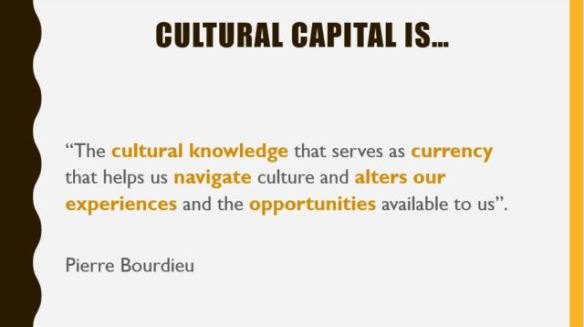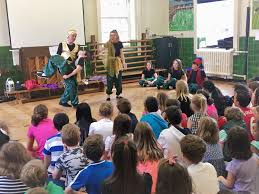Dissertation title: How access to drama within the Key Stage 1 and 2 curriculum could enhance the cultural capital of the learner, in accordance with the Ofsted education inspection framework.
When writing my dissertation, I chose to explore Ofsted’s concept of ‘Cultural Capital’, within the education inspection framework and identified how it was incorporated into the national curriculum. I linked this to a proposal that schools could enhance their pupils’ cultural capital by increasing access to drama and theatre. Researching the concept of Ofsted’s cultural capital, offered an insight into an important element of the national curriculum, that I would undoubtedly encounter in my future teaching career.
A clear understanding of the origin of the term cultural capital, enabled me to appreciate why Ofsted’s definition was met with criticism, when it was introduced into the education inspection framework (EIF) in September 2019. Experts deemed it controversial, due to it being based on class hierarchy, with one critic stating it was elitist (Mansell, 2019). The term was originally coined by French sociologist, Pierre Bourdieu, in 1986, whilst he was researching the unequal academic achievement of children from less privileged social backgrounds in France, in the 1960s. He found that the educational system demanded inherent skills and knowledge of pupils without specifically providing the tools to achieve them, which left some children at a disadvantage in the classroom. Bourdieu believed that children who had a more affluent upbringing, were influenced by their parents’ positive habits and interests, thus displaying better knowledge and behaviours in class (Bourdieu, 2011). In short, Bourdieu’s cultural capital theory implied that a child’s achievement at school was greatly enhanced by cultural capital inherited from their parents, which would lead to them moving in higher social circles, enabling better social status and greater access to employment (Grenfell, 2014). A further study conducted by Bourdieu, placed emphasis on the arts, stating that personal tastes often dictated social class. Those with an appreciation for fine art and the associated aesthetic knowledge, were typically of a higher class than those who preferred art, music and shows from popular culture (Bourdieu, 1984).

Ofsted define cultural capital as ‘the essential knowledge that pupils need to be educated citizens, introducing them to the best that has been thought and said and helping to engender an appreciation of human creativity and achievement’ (Ofsted, 2019). With such a vague definition, it was open to interpretation, resulting in differing opinions from professionals. Critics argued that by using the term ‘cultural capital’, Ofsted were advocating upper class culture, reinforcing class stereotypes and encouraging those from differing backgrounds to neglect their heritage and disregard the culture in which they had grown up. Others welcomed the inclusion of cultural capital and used it to further benefit the children, giving their curriculum an overhaul and ensuring more opportunities, to increase cultural capital. Regardless of people’s opinions, Ofsted have the final say during their inspections, so schools that welcome cultural capital and implement it well, have a better chance of success, during the judgment process.
As Bourdieu associated his theories with the arts, I wanted to take that forward and apply it to modern education. I initiated research into local teachers’ interpretations of Ofsted’s definition of cultural capital but was met with differing responses. Teachers in schools from underprivileged areas had a great understanding of the term, which was evidenced by their implementation of cultural capital through various schemes however, other teachers had little to no understanding of it. Given that cultural capital was a huge factor of the revised EIF, it was concerning that some schools had not placed emphasis on it, especially as a school could only be awarded a ‘Good’ rating, if cultural capital was evident throughout the school (Ofsted, 2019). Alongside this, I enquired if drama was incorporated in the classroom. This was met more positively, with all teachers responding with how they did this, and most teachers agreed that by introducing drama to their pupils, their exposure to cultural capital was increased.

My notion for using drama to increase cultural capital, was motivated by my own experience of viewing and taking part in theatre performances, during my primary education. It inspired me to join a free community drama group and fuelled my passion for music and singing, which I doubt I would have developed, had I not encountered these experiences at an early age. This extends to any other experience that a school may provide that is outside of classroom learning, such as visiting museums and farms, meeting authors or artists and experiencing live music. One education practitioner discussed cultural capital and stated that ‘every child has a spark inside them and it is our responsibility to ignite that spark’(O’Sullivan, 2019), meaning that the more a child is exposed to during their time in education, the more opportunities they have to identify their talents. Another contributing factor to my notion, was that by participating in a theatre production in school, pupils were introduced to other aspects, such as costume design, prop making, set design, dancing and music, which could inspire children to venture down other avenues within performing arts.
Researching cultural capital and analysing all relevant Ofsted documentation, enabled me to gain a complete understanding of the procedures involved during Ofsted inspections and provided me with useful knowledge that I could take forward in my chosen career. I recently discussed my dissertation content during an interview for teacher training, which I felt benefited me, as I was able to add an extra layer to my knowledge and experience of drama in education, which was well received by the panel, resulting in me gaining a place on their program.
References
Bourdieu, P. (1984). Distinction: A Social Critique of the Judgement of Taste. 18th ed. London: Routledge & Kegan Paul.
Bourdieu, P. (2011). The Forms of Capital. In: I. Sezman and T. Kaposy, ed., Cultural Theory, 1st ed. Chichester: Wiley-Blackwell, pp.82-84.
Grenfell, M. (2014). Pierre Bourdieu: Key Concepts. 2nd ed. Oxon: Routledge, pp.10-13.
Mansell, W. (2019). Ofsted plan to inspect ‘cultural capital’ in schools attacked as elitist. [online] the Guardian. Available at: https://www.theguardian.com/education/2019/sep/03/ofsted-plan-inspect-cultural-capital-schools-attacked-as-elitist .
Ofsted (2019). School Inspection Handbook. Manchester: Crown Copyright, p.43.
Ofsted (2019). The Education Inspection Framework. Manchester: Crown Copyright.
O’Sullivan, J. (2019). What is Cultural Capital? – LEYF Nurseries. [online] LEYF Nurseries. Available at: https://www.leyf.org.uk/what-is-cultural-capital/.
